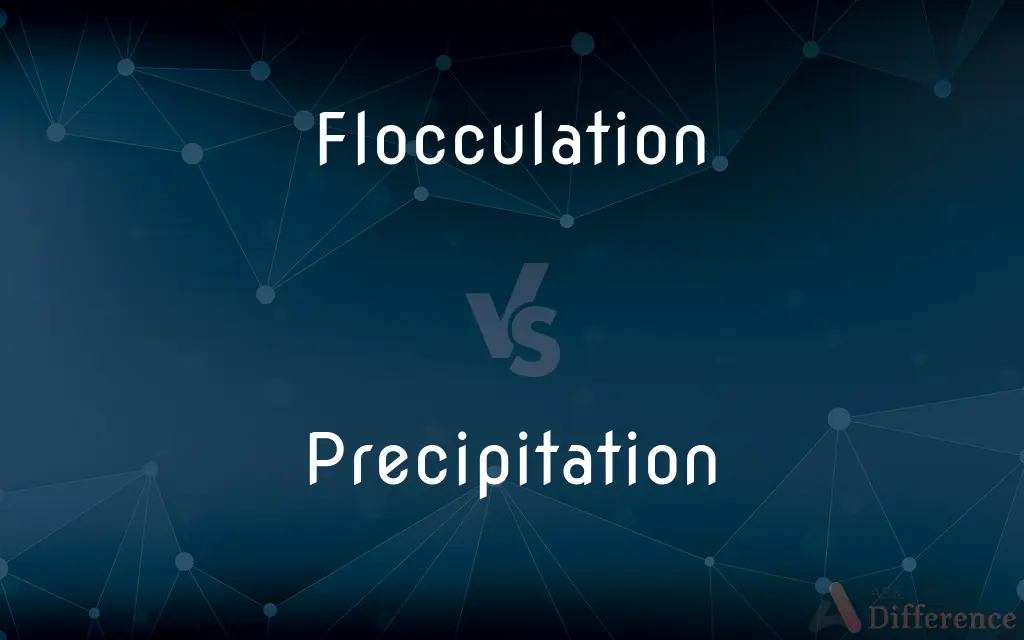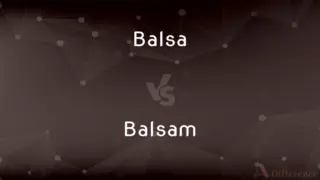Flocculation vs. Precipitation — What's the Difference?
Edited by Tayyaba Rehman — By Fiza Rafique — Updated on September 28, 2023
Flocculation is the aggregation of particles into clumps. Precipitation is the process where dissolved substances form solid particles that settle.

Difference Between Flocculation and Precipitation
Table of Contents
ADVERTISEMENT
Key Differences
Flocculation refers to the process where fine particles or colloids come together to form larger aggregates, often with the assistance of a flocculating agent. Precipitation, on the other hand, is a chemical process in which dissolved substances form solid particles that fall out or settle from a solution.
The primary goal of flocculation is to make suspended particles larger, making them easier to remove from liquids, especially in water treatment processes. Conversely, precipitation is chiefly concerned with removing unwanted dissolved ions or compounds from solutions by transforming them into solids.
Flocculation often involves the use of flocculating agents, which promote the clumping of fine particles. Precipitation usually requires a precipitating agent or a change in conditions like temperature or pH to cause the dissolved substances to form solids.
In flocculation, the formed flocs can often be redispersed upon vigorous agitation. However, in precipitation, once a substance has precipitated, it typically won't redissolve unless the solution's conditions change.
While both flocculation and precipitation are essential processes in various fields like water treatment, chemistry, and environmental science, they operate based on different principles and achieve different outcomes.
ADVERTISEMENT
Comparison Chart
Nature of Process
Physical aggregation of particles
Chemical process of forming solids from dissolved ions
Purpose
To clump fine particles for easier removal
To remove dissolved substances from a solution
Dependence on Agents
Often requires flocculating agents
Usually requires a precipitating agent
Reversibility
Can be redispersed with agitation
Typically irreversible unless conditions change
Common Use
Water treatment to remove suspended particles
Chemistry to isolate compounds or purify solutions
Compare with Definitions
Flocculation
The aggregation of particles in a solution into clumps or flocs.
During beer production, flocculation helps in yeast removal.
Precipitation
The process where a dissolved substance forms a solid and settles from a solution.
Salt precipitation occurs when seawater evaporates.
Flocculation
The act of gathering into lumps or masses.
The river water underwent flocculation after the addition of certain chemicals.
Precipitation
The act of causing a solid substance to separate from a solution.
The lab experiment resulted in the precipitation of crystals.
Flocculation
The process of forming larger particles from fine suspended particles.
The water treatment plant uses flocculation to clarify the water.
Precipitation
The formation of a solid in a solution due to a chemical reaction.
Adding silver nitrate caused the precipitation of a white solid.
Flocculation
A phenomenon where colloids come together to form larger masses.
Flocculation can be seen when milk proteins clump together.
Precipitation
The settling out of suspended particles from a solution.
The acid led to the precipitation of impurities from the mixture.
Flocculation
The coalescence of dispersed particles in a liquid.
Flocculation aids in wastewater treatment by settling out contaminants.
Precipitation
In meteorology, precipitation is any product of the condensation of atmospheric water vapor that falls under gravitational pull from clouds. The main forms of precipitation include drizzling, rain, sleet, snow, ice pellets, graupel and hail.
Flocculation
Flocculation, in the field of chemistry, is a process by which colloidal particles come out of suspension to sediment under the form of floc or flake, either spontaneously or due to the addition of a clarifying agent. The action differs from precipitation in that, prior to flocculation, colloids are merely suspended, under the form of a stable dispersion, in a liquid and are not truly dissolved in solution.Coagulation and flocculation are important processes in water treatment with coagulation aimed to destabilize and aggregate particles through chemical interactions between the coagulant and colloids, and flocculation to sediment the destabilized particles by causing their aggregation into floc.
Precipitation
The action or process of precipitating a substance from a solution.
Flocculation
To cause (individual particles of clay) to aggregate into clotlike masses or precipitate into small lumps.
Precipitation
Rain, snow, sleet, or hail that falls to or condenses on the ground
These convective processes produce cloud and precipitation
The heavy post-monsoon precipitations
Flocculation
To cause (clouds) to form fluffy masses.
Precipitation
The fact or quality of acting suddenly and rashly
Cora was already regretting her precipitation
Flocculation
To form lumpy or fluffy masses.
Precipitation
Any form of water, such as rain, snow, sleet, or hail, that falls to the earth's surface.
Flocculation
A condition in which clays, polymers or other small charged particles become attached and form a fragile structure, a floc.
Precipitation
The quantity of such water falling in a specific area within a specific period.
Flocculation
The process by which small particles of fine soils and sediments aggregate into larger lumps.
Precipitation
A hastening or acceleration, especially one that is sudden or unexpected
He is responsible for the precipitation of his own demise.
Flocculation
The process of flocculating; forming woolly cloudlike aggregations
Precipitation
Abrupt or impulsive haste.
Precipitation
A headlong fall or rush.
Precipitation
(Chemistry) The process of separating a substance from a solution as a solid.
Precipitation
(meteorology) Any or all of the forms of water particles, whether liquid or solid, that fall from the upper atmosphere (e.g., rain, hail, snow or sleet). It is a major class of hydrometeor, but it is distinguished from cloud, fog, dew, rime, frost, etc., in that it must fall. It is distinguished from cloud and virga in that it must reach the ground.
Precipitation
A hurried headlong fall.
Precipitation
A reaction that leads to the formation of a heavier solid in a lighter liquid; the precipitate so formed at the bottom of the container.
Precipitation
(figuratively) Unwise or rash rapidity; sudden haste.
Precipitation
The act of precipitating, or the state of being precipitated, or thrown headlong.
In peril of precipitationFrom off rock Tarpeian.
Precipitation
A falling, flowing, or rushing downward with violence and rapidity.
The hurry, precipitation, and rapid motion of the water, returning . . . towards the sea.
Precipitation
Great hurry; rash, tumultuous haste; impetuosity.
Precipitation
The act or process of precipitating from a solution.
Precipitation
A deposit on the earth of hail, mist, rain, sleet, or snow; also, the quantity of water deposited.
Precipitation
The quantity of water falling to earth at a specific place within a specified period of time;
The storm brought several inches of precipitation
Precipitation
The process of forming a chemical precipitate
Precipitation
The falling to earth of any form of water (rain or snow or hail or sleet or mist)
Precipitation
The act of casting down or falling headlong from a height
Precipitation
An unexpected acceleration or hastening;
He is responsible for the precipitation of his own demise
Precipitation
Overly eager speed (and possible carelessness);
He soon regretted his haste
Precipitation
The falling of water, in any form, from the atmosphere to the ground.
The weather forecast predicts heavy precipitation tomorrow.
Common Curiosities
Why is flocculation important in water treatment?
Flocculation helps clump fine particles, making them easier to remove from the water.
Can flocculation be reversed?
Yes, flocculation is often reversible with vigorous agitation.
Is precipitation always irreversible?
Typically, but a precipitated substance can redissolve if the solution's conditions change.
What is flocculation?
Flocculation is the aggregation of fine particles into larger clumps or flocs.
What promotes flocculation in a solution?
Flocculating agents or changes in solution conditions can promote flocculation.
Are flocculation and coagulation the same?
No, coagulation destabilizes particles, while flocculation aggregates them.
How does precipitation differ from flocculation?
Precipitation is a chemical process where dissolved substances form solids, while flocculation is the physical clumping of particles.
Is flocculation a chemical or physical process?
Flocculation is primarily a physical process.
What's a common example of precipitation?
The formation of salt crystals from evaporating seawater is an example of precipitation.
Does precipitation always result in a solid?
Usually, precipitation refers to the formation of a solid from a solution.
Can flocculation occur naturally?
Yes, flocculation can occur naturally under certain conditions.
Can precipitation occur in any solution?
Precipitation can occur if the dissolved substance exceeds its solubility limit or if a precipitating agent is added.
What can cause precipitation in a chemical reaction?
Introducing a reagent that forms an insoluble compound can cause precipitation.
Are there specific agents used for flocculation and precipitation?
Yes, flocculating agents aid flocculation, while precipitating agents can induce precipitation.
What factors influence precipitation?
Factors like temperature, concentration, and the presence of precipitating agents influence precipitation.
Share Your Discovery

Previous Comparison
Balsa vs. Balsam
Next Comparison
Abscond vs. EscapeAuthor Spotlight
Written by
Fiza RafiqueFiza Rafique is a skilled content writer at AskDifference.com, where she meticulously refines and enhances written pieces. Drawing from her vast editorial expertise, Fiza ensures clarity, accuracy, and precision in every article. Passionate about language, she continually seeks to elevate the quality of content for readers worldwide.
Edited by
Tayyaba RehmanTayyaba Rehman is a distinguished writer, currently serving as a primary contributor to askdifference.com. As a researcher in semantics and etymology, Tayyaba's passion for the complexity of languages and their distinctions has found a perfect home on the platform. Tayyaba delves into the intricacies of language, distinguishing between commonly confused words and phrases, thereby providing clarity for readers worldwide.














































